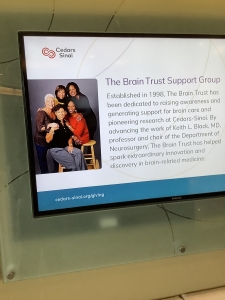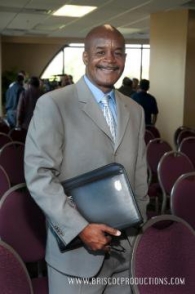Brain Surgeon: A Doctor’s Inspiring Encounters with Mortality and Miracles, by Keith Black, MD (Wellness Books, trademark of Hatchette Book Group, Inc., New York, NY 2009, 226 pages).
Book Review by Dennis Moore
Photos of Author by: Kareem BH Photography
February 26, 2025 (San Diego - Having written more than 400 book reviews, two of which contributed towards the authors winning the NAACP Image Award in Literature, this book by Dr. Keith Black is foremost the most intriguing and insightful book that I have ever read, for it deals with life and death. I am truly honored and inspired!
Brain Surgeon: A Doctor’s Inspiring Encounters with Mortality and Miracles delves into the realm of what actually constitutes life and death, and it places Dr. Keith Black in a place that few if any could ever dream or hope for. Having written all those book reviews, from that of former Vice-President Hillary Clinton, President Donald Trump, Lakers’ Owner Jeanie Buss, and former Barack Obama White House Advisor Valerie Jarrett, I say this with the most humble of intentions as a book reviewer.
 Dr. Keith Black, who serves as chairman of the department of neurosurgery and director of the Maxine Dunitz Neurosurgical Institute at Cedars-Sinai Medical Center, has an extraordinary ability to combine cutting edge research and an extremely busy surgical practice. Since 1987, he has performed more than 5,000 operations for resection of brain tumors, up until the publication of this book in 2009. One can only marvel and guess at the number of operations since then.
Dr. Keith Black, who serves as chairman of the department of neurosurgery and director of the Maxine Dunitz Neurosurgical Institute at Cedars-Sinai Medical Center, has an extraordinary ability to combine cutting edge research and an extremely busy surgical practice. Since 1987, he has performed more than 5,000 operations for resection of brain tumors, up until the publication of this book in 2009. One can only marvel and guess at the number of operations since then.
Perhaps most insightful to me about this book, and endearing to me about the author, is one simple passage which states: “We take care of people. Part of what we are doing is God’s work, and what I like about the way it is set up now is that there is no conflict of interest for me. There is no incentive to do surgeries, but there is no incentive to turn people away, either.” Talk about compassion!
The author states in this book, in further regard to his statement of “we take care of people”: “Cedars has been incredibly supportive of what I do. I am fortunate to have a formidable group of dedicated fund-raisers in my corner. Maxine Dunitz gave the founding gift for the Neurosurgical Institute. Another group of remarkable women who support our work call themselves the Brain Trust, and they are truly a force of nature. Headed by Pauletta Washington, Keisha Whittaker, Johnnie Cochran’s widow, Dale, and several other remarkable women, they have raised more than $20 million for us to date. We couldn’t do what we do without them.”
 An example of what Dr. Black means when he says that they couldn’t do what they do without them, is clearly stated here: “I worked on a young Ethiopian boy who was brought to the United States by a relief organization called Save the Children. Elijah was getting headaches and was becoming unresponsive. The local doctor said that he needed a CT scan, but apparently there is only one CT scanner in all of Ethiopia. When he finally got the scan a couple of months later, they found a huge posterior fossa tumor, and no neurosurgeon in the country would operate on him.” Fortunately, Pauletta Washington, Denzel Washington’s wife, and the “Brain Trust” came to the rescue! The Brain Trust is pictured here!
An example of what Dr. Black means when he says that they couldn’t do what they do without them, is clearly stated here: “I worked on a young Ethiopian boy who was brought to the United States by a relief organization called Save the Children. Elijah was getting headaches and was becoming unresponsive. The local doctor said that he needed a CT scan, but apparently there is only one CT scanner in all of Ethiopia. When he finally got the scan a couple of months later, they found a huge posterior fossa tumor, and no neurosurgeon in the country would operate on him.” Fortunately, Pauletta Washington, Denzel Washington’s wife, and the “Brain Trust” came to the rescue! The Brain Trust is pictured here!
The Foreword to this informative and intriguing book by renowned actor, Forest Whitaker, perhaps says it best as he states: ‘”What can we do.”’ This was my mother’s reaction when she was told of the tumor that had invaded my grandmother’s brain. “Where do we go from here?”’
"As my mother pondered these questions she was reminded of a magazine article she had saved years before. There was a surgeon on the cover who was described as the best neurosurgeon in the world. She had saved it for its historic value, since the man on the cover of this magazine was black. Now she proceeded to search through her things to find the clipping, and then she made a call to the hospital to see if she could speak with Dr. Keith Black.” From there, everything else is history, the creation of a medical icon!"
Mr. William Tao, a wealthy Hong Kong real estate entrepreneur, who divided his time between Hong Kong and Los Angeles, praised Dr. Black for the surgery that he performed on his brain. Mr. Tao’s cancer in the brain was diagnosed as a Glioblastoma Multiforme (GBM)-the most malignant of all brain tumors. It is inspiring how the surgery for Mr. Tao is described in this book, and the team that Dr. Black utilized to perform it.
 An insightful and interesting passage in Dr. Keith Black’s book relates to the surgery of Tionne Watkins in regard to a “vestibular schwannonoma”, which states: “Now it was time to close. After we got a good water-tight seal on the dura, small titanium plates were used to anchor the portion of Tionne’s skull we had removed back in place. The scalp was then closed in layers with a subcutaneous plastic surgery closure that would not leave a scar. No one would know that we had ever been there.”
An insightful and interesting passage in Dr. Keith Black’s book relates to the surgery of Tionne Watkins in regard to a “vestibular schwannonoma”, which states: “Now it was time to close. After we got a good water-tight seal on the dura, small titanium plates were used to anchor the portion of Tionne’s skull we had removed back in place. The scalp was then closed in layers with a subcutaneous plastic surgery closure that would not leave a scar. No one would know that we had ever been there.”
In further regard to Tionne Watkins, of the famed musical group “TLC”, Dr. Black indicated in his book that “Tionne’s operation had taken six hours, but it looked like there was good news all around.” Additionally, Dr. Black stated in this warm and heartfelt book that: “Twenty-six years ago, as a young intern, I had watched a surgical team take thirty-two hours to remove a vestibular schwannoma. The patient survived the operation, but was neurologically devastated. I thought briefly on how far we’d come in just a generation.” This says more about Dr. Black’s skill and expertise as a neurosurgeon than the medical profession itself.
Throughout this book, the author gives examples of patients that he has brought back from despair and possible death. He also gives examples of different forms of cancer, and how to attack and defeat them. He gives an example of something that we might want to ponder, stating: “Because we know that X-rays can induce brain tumors, dental X-rays should be minimized. Every time I go to the dentist I am asked if I want to have my teeth x-rayed, and I routinely refuse. I haven’t had a dental X-ray in twenty years.” He certainly has put something on my mind, going forward! As a matter of fact, just recently while in the dentist’ chair, the dental assistant (Dr. Evelyn Hersel) told me that Dr. Black had performed surgery on her mother for cancer! How ironic, but then again this book is full of tantalizing ironies!
The author of this book, BRAIN SURGEON, states in regard to cancer: and its development: “One of the most exciting developments in cancer research is the discovery of the cancer stem cell. Within the body, stem cells are primitive, undifferentiated cells that evolve into heart cells, lung cells, brain cells, and other kinds of cells specific to our body’s various organs. From our earliest moments until we die, stem cells are hard at work, replenishing our dying cells with new ones. The cancer stem cell, it seems, functions in much the same way, enabling the tumor to grow by populating it with new cells.” I didn’t know that!!
In further regard to stem cells, Dr. Black states in his book: “Researchers in Canada first discovered cancer stem cells in 1997. The first cancer stem cells to be identified were those of leukemia, but additional studies documented the existence of stem cells in other types of cancers. At Cedars-Sinai we have isolated stem cells in glioblastoma tumors. This discovery may have far-reaching implications.”
In another aspect of this book, which is rich in irony, in a phone call from Dr. Black’s office to me set up by his executive assistant Teresita Casipe-Bellon, I took the liberty to suggest to Dr. Black that this excellent book should be made into a movie with the actor Courtney Vance of my West Angeles Church of God here in Los Angeles playing the role of Dr. Black, realizing that may have been a bit presumptious of me. Incidentally, Courtney Vance is the husband of noted actress Angela Bassett.
Additionally, aforementioned Pauletta Washington and Denzel Washington were members of my West Angeles Church family, the first 27 years that they were out here. The author, Dr. Keith Black, had no way of knowing that 15 years after writing this amazing book that Denzel Washington would be ordained as a minister. Talk about ironies! My son Julien actually had a very small part in Denzel Washington’s movie, “The Little Things!
This amazing book should be required reading for all medical students, especially those going into the field of Neurology, for a variety of reasons, and someone should nominate Dr. Keith Black for the Nobel Prize in Physiology and Medicine! This, a man of humble beginnings, from Auburn, Alabama!
To sum up this incredible book, the author states: “It was yet another reminder that my patients fight their disease with the greatest dignity and spirit one can ever imagine. Their courage inspires me to focus every drop of energy I have in myself to provide them with the best odds possible to beat this disease, or at least give them as much quality life as our surgeries and medicines will allow. They are my heroes, and I hope one day all of their bravery and determination will help lead them to a cure.”
I too, am a cancer survivor, having been cured from Leiomyosarcoma in my hometown of Chicago in 1999! My brother Ronnie in Chicago has recently contracted prostrate cancer.
 Dennis Moore has been the Associate Editor of the East County Magazine in San Diego and the editor of SDWriteway, an online newsmagazine in San Diego that has partnered with the East County Magazine, along with being the President of the Bethel A.M.E. Prison Ministry in San Diego.He is also the author of a book about Chicago politics, “The City That Works, Power, Politics and Corruption in Chicago”. Mr. Moore can be contacted at contractsagency@gmail.com or you can reach him on Twitter(X).
Dennis Moore has been the Associate Editor of the East County Magazine in San Diego and the editor of SDWriteway, an online newsmagazine in San Diego that has partnered with the East County Magazine, along with being the President of the Bethel A.M.E. Prison Ministry in San Diego.He is also the author of a book about Chicago politics, “The City That Works, Power, Politics and Corruption in Chicago”. Mr. Moore can be contacted at contractsagency@gmail.com or you can reach him on Twitter(X).

 Dr. Keith Black, who serves as chairman of the department of neurosurgery and director of the Maxine Dunitz Neurosurgical Institute at Cedars-Sinai Medical Center, has an extraordinary ability to combine cutting edge research and an extremely busy surgical practice. Since 1987, he has performed more than 5,000 operations for resection of brain tumors, up until the publication of this book in 2009. One can only marvel and guess at the number of operations since then.
Dr. Keith Black, who serves as chairman of the department of neurosurgery and director of the Maxine Dunitz Neurosurgical Institute at Cedars-Sinai Medical Center, has an extraordinary ability to combine cutting edge research and an extremely busy surgical practice. Since 1987, he has performed more than 5,000 operations for resection of brain tumors, up until the publication of this book in 2009. One can only marvel and guess at the number of operations since then. An example of what Dr. Black means when he says that they couldn’t do what they do without them, is clearly stated here: “I worked on a young Ethiopian boy who was brought to the United States by a relief organization called Save the Children. Elijah was getting headaches and was becoming unresponsive. The local doctor said that he needed a CT scan, but apparently there is only one CT scanner in all of Ethiopia. When he finally got the scan a couple of months later, they found a huge posterior fossa tumor, and no neurosurgeon in the country would operate on him.” Fortunately, Pauletta Washington, Denzel Washington’s wife, and the “Brain Trust” came to the rescue! The Brain Trust is pictured here!
An example of what Dr. Black means when he says that they couldn’t do what they do without them, is clearly stated here: “I worked on a young Ethiopian boy who was brought to the United States by a relief organization called Save the Children. Elijah was getting headaches and was becoming unresponsive. The local doctor said that he needed a CT scan, but apparently there is only one CT scanner in all of Ethiopia. When he finally got the scan a couple of months later, they found a huge posterior fossa tumor, and no neurosurgeon in the country would operate on him.” Fortunately, Pauletta Washington, Denzel Washington’s wife, and the “Brain Trust” came to the rescue! The Brain Trust is pictured here! An insightful and interesting passage in Dr. Keith Black’s book relates to the surgery of Tionne Watkins in regard to a “vestibular schwannonoma”, which states: “Now it was time to close. After we got a good water-tight seal on the dura, small titanium plates were used to anchor the portion of Tionne’s skull we had removed back in place. The scalp was then closed in layers with a subcutaneous plastic surgery closure that would not leave a scar. No one would know that we had ever been there.”
An insightful and interesting passage in Dr. Keith Black’s book relates to the surgery of Tionne Watkins in regard to a “vestibular schwannonoma”, which states: “Now it was time to close. After we got a good water-tight seal on the dura, small titanium plates were used to anchor the portion of Tionne’s skull we had removed back in place. The scalp was then closed in layers with a subcutaneous plastic surgery closure that would not leave a scar. No one would know that we had ever been there.” Dennis Moore has been the Associate Editor of the East County Magazine in San Diego and the editor of SDWriteway, an online newsmagazine in San Diego that has partnered with the East County Magazine, along with being the President of the Bethel A.M.E. Prison Ministry in San Diego.He is also the author of a book about Chicago politics, “The City That Works, Power, Politics and Corruption in Chicago”. Mr. Moore can be contacted at
Dennis Moore has been the Associate Editor of the East County Magazine in San Diego and the editor of SDWriteway, an online newsmagazine in San Diego that has partnered with the East County Magazine, along with being the President of the Bethel A.M.E. Prison Ministry in San Diego.He is also the author of a book about Chicago politics, “The City That Works, Power, Politics and Corruption in Chicago”. Mr. Moore can be contacted at